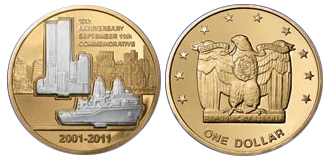Sellers Of Imitation “Exclusively Authorized” 9/11 Commemorative Coins To Pay $750,000
Thing is, the folks at the National Collector’s Mint hadn’t been given any sort of exclusive authority by the government to make the coins. And though one might not need anyone’s approval to sell a piece of metal commemorating the tragic event, you probably shouldn’t stamp that piece of metal with the words “One Dollar” if you don’t want to tick off the government.
“Congress has the exclusive power to coin money of the United States,” wrote the U.S. Mint in a consumer advisory regarding the imitation coins. “Congress has delegated its authority to mint and issue coins to the Secretary of Treasury, and Congress requires the Secretary to carry out these duties at the United States Mint. Thus, the United States Mint is the only government entity in the United States with the authority to coin money.”
The makers of the coin stated that its product was actually legal tender in the nation of Liberia.
Regardless, the Federal Trade Commission — which has reached a $750,000 settlement with National Collector’s Mint — alleges the company violated the Hobby Protection Act by producing imitations of the U.S. Mint’s medal without marking them “COPY” as the act requires.
Furthermore, claims the FTC, the makers of these coins charged consumers for items they never ordered, and made returning the product difficult — and costly — if not impossible.
Per the FTC, when people called the National Collector’s Mint number to order, the automated system presented them with offers for additional products. Not only could the callers not bypass these upsells, the agency alleges that consumers were having these add-on items put on their bill even if they stated that they only wanted the coins.
“The defendants allegedly failed to provide the total cost of the purchase, a breakdown of the items ordered, and critical refund policy terms, and their lengthy and confusing ordering system resulted in many consumers receiving products they did not order,” explains the FTC.
When customers tried to return their purchases, they hit a huge number of obstacles, says the agency. The stated policy was that buyers could receive a full, prompt refund within 30 days. But the FTC says National Collector’s failed to tell customers that they would have to pay for insurance and shipping before the refunds could be given. Furthermore, alleges the FTC, customers who spent more than $100 were told they had to speak with a live phone rep to get a return authorization number. But many customers complained about not being able to even reach a human being at the company.
In the end, the U.S. Mint went with a silver medal that looked nothing like what the National Collector’s Mint produced.
Want more consumer news? Visit our parent organization, Consumer Reports, for the latest on scams, recalls, and other consumer issues.


